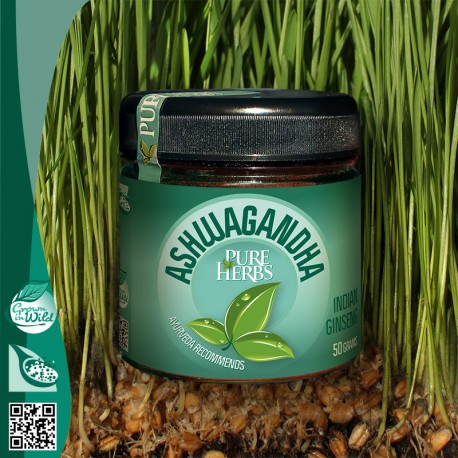No products
Ashwagandha choorn
New product
ASHWAGANDA "Natural antioxidant and adaptogen", powder
More info
"Natural antioxidant and adaptogen", ASHWAGANDA, PureHerbs.eu, powder
"ASHVAGANDHA"
(combination of medicinal plants churna)
ASHVAGANDHA is a unique Ayurvedic remedy manufactured according to the technologies and formulation developed by the Vedic Institute of Healthcare and Research, in accordance with the requirements of the Ayurvedic Pharmacopoeia. In the literature, often, Ashwagandha is called Indian ginseng and winter cherry.
Recipe based on combinations of unique pharmacological properties of powder and providing the necessary amount and composition of substances.
In the technological process, the company uses only wild-growing raw materials whenever possible, which allows us to meet the highest requirements for the quality and potency of the final product. In a formulation that does not contain hidden chemically synthesized fillers and components.
Action: increase the resistance of the human immune system to an external aggressive environment. As an additional remedy for hypothyroidism, infertility, during menopause, dementia and other neurodegenerative diseases. Ashwagandha is known as an adaptogen and aphrodisiac. Athletes fell in love with it as a means of helping to overcome the load and contributing to an increase in muscle mass.
Compound:
50g, 100g or 1kg
Indian ginseng powder (Withania somnifera)
Dosage:
1/2-1 tsp twice a day on an empty stomach, drink warm water or milk.
Best of all, mix with 150 ml of milk, a pinch of turmeric, a few saffron stamens and half a teaspoon of ghee, heat without boiling. Turn off, let cool and drink.
The optimal course of admission:
two or three months.
PureHerbs brand manufacturer and distributor:
“Vedic Institute of Healthcare and Research”
www.pureherbs.eu, sales@pureherbs.eu
Suitable for vegetarians and vegans. Do not use ASHVGANDHA, in high doses, during pregnancy. Has no established side effects. When following dosage recommendations, Ayurvedic preparations are absolutely safe and effective.
*Note: Do not exceed the stated recommended dose. It is not a meal replacement. Keep out of the reach of children, avoid direct sunlight. Store at room temperature, normal humidity. The expiration date applies to undamaged packaging, subject to the storage rules.
Description of the plant Ashwagandha (Withania somnifera):
Although historically domesticated as a medicinal herb in India, this plant grew and was traditionally used as a rejuvenating herb in the ancient Mediterranean countries, Palestine, Asia and most of the Arab countries, as well as Africa.
In historical Ayurvedic texts, the root was believed to give strength and sexual masculinity to the horse. Some African tribes also used this plant as an aphrodisiac. But despite its name meaning the smell of a horse, ancient cultures knew that ashwagandha offered far more benefits than those cited as attributes of equine physical strength and masculinity. In fact, it would be harder to name the areas where Ayurveda suggests that ashwagandha does not have any medicinal benefits than the areas it provides.
Here are some of the well-known examples of the historical use of ashwagandha in Ayurveda, Unani and traditional medicine of the Middle East, which, over the centuries, has proven the effectiveness of the prescription of ashwagandha in the treatment and prevention of conditions and diseases such as:
For
Stimulation of the immune system
Improving the functions of the reproductive system, increasing libido and fertility (men and women)
Endurance Boost
Strengthening weakened muscles and skeletal organs
Stimulation of liver function
Longevity
At
Exhaustion
Weakened muscles and skeletal organs
Arthritis and other inflammatory conditions
asthma
Problems with the digestive system
Ashwagandha is still used medicinally throughout Africa and India. Practitioners of Ayurveda in India use this plant to treat conditions, including its use as a laxative, diuretic, and liver tonic. In Cape Verde, the leaves are prescribed as a tonic, purgative, and as a remedy for gonorrhea. In Ethiopia, ashwagandha is used to treat epilepsy and cough, and in Madagascar it is used to treat asthma. In South Africa, it is used to improve female fertility, and in Somalia, the roots are given to children as a remedy for nightmares.
Sources of information: Ayurvedic Pharmacopoeia of India (API), PubMed, www.ashwagandha.com





